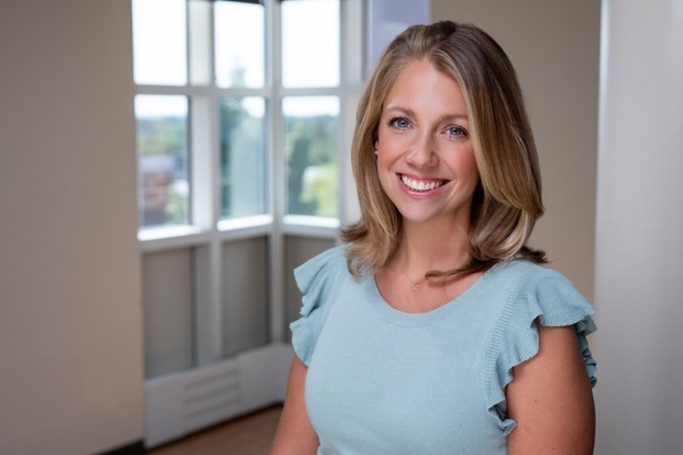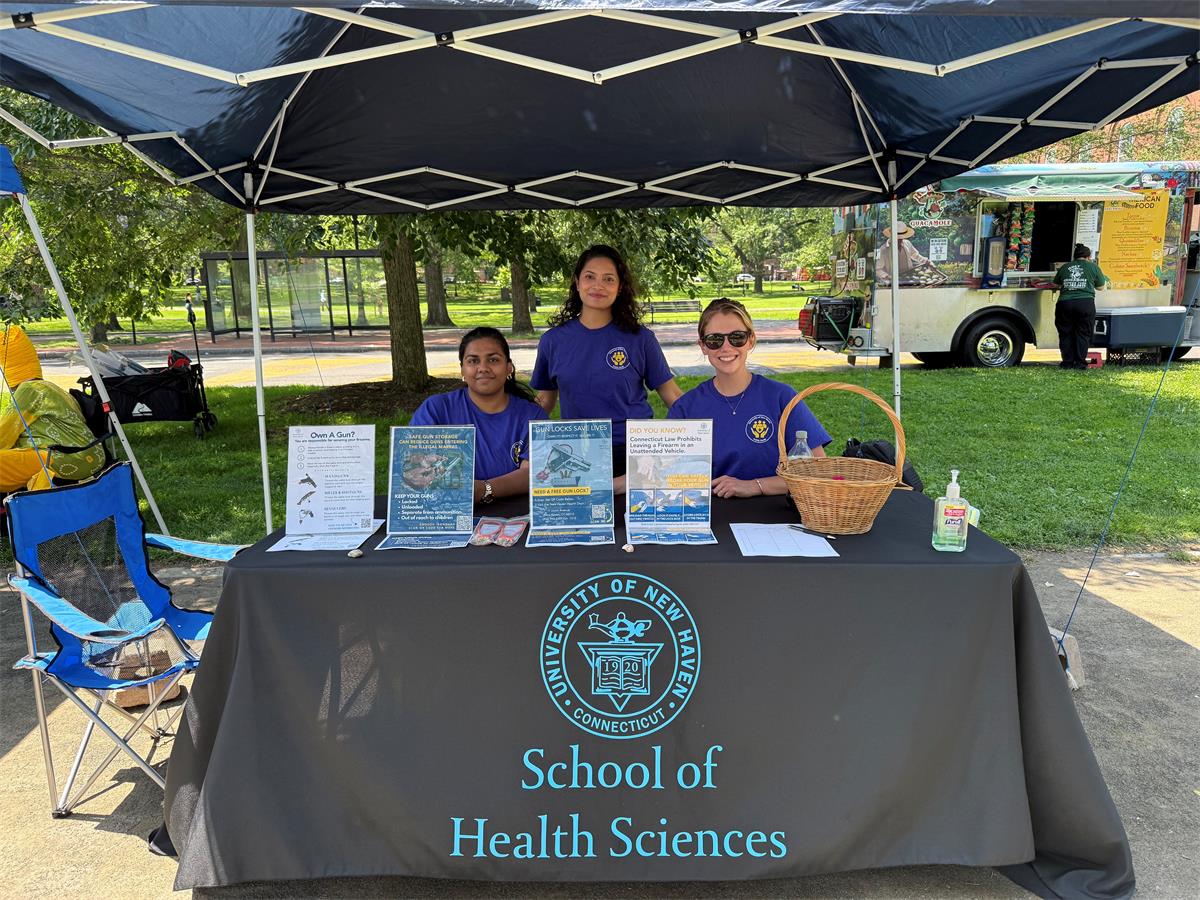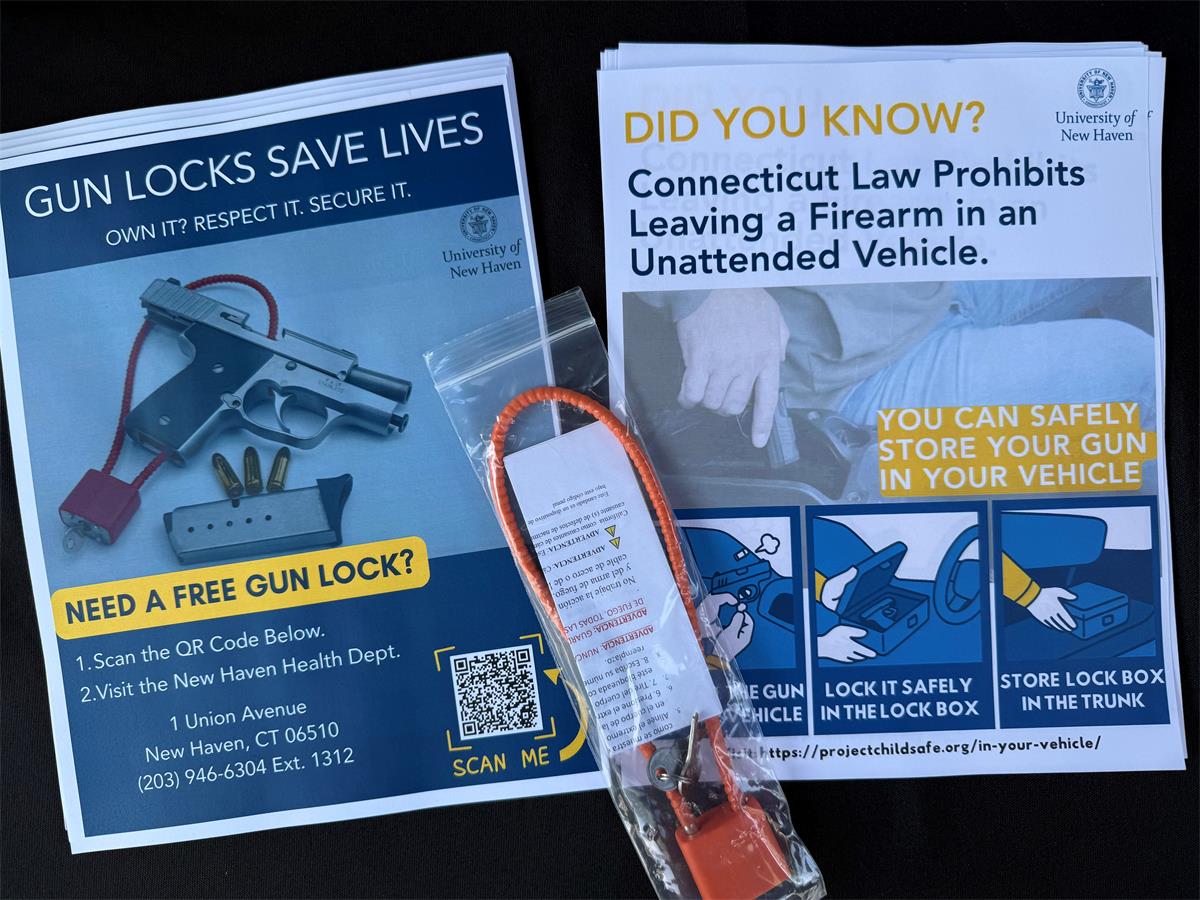When the University of New Haven hired Jamie Luckhardt as a Practitioner in Residence, they weren’t filling a conventional faculty position—they were building a bridge. After nearly a decade of working in local health in Connecticut, Luckhardt brought the cadence of the field directly into the MPH curriculum. “I bring my practical 
experience into our classroom,” she explains. “We do projects such as a community needs assessment and a program proposal plan they would be able to apply for a grant with—just like they might do in a future job role.”
Today, Luckhardt teaches graduate courses in Public Health Practice, Health Behavior and Society, Health Education & Promotion, Global Health, and Community Health Nutrition. Her courses lean hard into real-world application—the same tools practitioners rely on every day (think County Health Rankings and Healthy People 2030 objectives) show up in her assignments, labs, and workshops. “It’s not just lecture-then-test in my classroom,” she says. “Of course, I teach the book, but I present it in a practical way.”
Recently, she hosted a systems-thinking workshop where faculty and students built causal loop diagrams around obesity, an experience that, as one student put it, lets learners “work through real-world problems.” That design earned Luckhardt the university’s Excellence in Teaching Faculty Award, a campus-wide honor recognizing evidence-based pedagogy, innovative approaches, and impactful mentoring. “It was a huge deal for me because I’m so new—and I’m not a PhD,” she says. “I was nominated by peers and students, and that meant everything.”
A Practitioner’s Path—and a Pivot that Changed Everything
Luckhardt didn’t begin in public health. Early in her career, while working as a medical assistant at MidState Medical Center, she thought nursing was the destination. But an experienced colleague saw her spark when she coached patients on diet, physical activity, and emotional well-being. “She told me, ‘You light up when you educate—and that’s public health.’” One advising appointment later, Luckhardt enrolled at Southern Connecticut State University, made the Dean’s List every semester, and never looked back. “My light shined. I knew I was working in my passion.”
an experienced colleague saw her spark when she coached patients on diet, physical activity, and emotional well-being. “She told me, ‘You light up when you educate—and that’s public health.’” One advising appointment later, Luckhardt enrolled at Southern Connecticut State University, made the Dean’s List every semester, and never looked back. “My light shined. I knew I was working in my passion.”
Her first decade working in local health as a Health Educator in the Naugatuck Valley Health District, Meriden Dept. of Health and Human Services, and the Town of Wallingford, spanned everything from asthma and mental health to lead and radon, and later, COVID-19 response. Then the pandemic closed childcare just as she had given birth to her first child. She made a hard family decision: step back from full-time work and focus on her newborn. “It was scary to go to one income,” she shares. “But public health gave me the skills—and the confidence—to keep contributing in other ways. You can consult, teach an adjunct class, or find project-based work. There are opportunities if you know where to look.”
Crucially, she kept her foot in the door by volunteering. A long-time member of the Connecticut Public Health Association (CPHA), she answered the call to revive the Health Education Committee as Co-Chair. “I wasn’t getting paid, but my name and my work stayed visible,” she says. “I even hosted health educational webinars with CPHA where local practitioners could join and earn CHES® CECH.”
That choice to stay connected through volunteer work was catalytic to her career. Through the CPHA she met Dr. Karl Minges, Ph.D., MPH, who later asked if she’d consider teaching an evening graduate course. “I came home after that first 6:30–9:00 pm class and said, ‘I just love this.’” One semester as adjunct became a full-time Practitioner in Residence. “That committee changed my whole trajectory—and it’s proof that networking truly matters.”
Luckhardt is candid about the importance of letting women pause for caregiving without permanently closing professional doors. “Public health rewarded me with ways to stay engaged while I was home with my son—volunteering, adjunct teaching, consulting. It shouldn’t be so hard for some to come back.” Her CPHA leadership made the return seamless, and opened the door to the role that has truly become her calling.
What “Practitioner in Residence” Really Means
At University of New Haven, the title is literal: a seasoned public health practitioner embedded in an academic role. For students, it means hands-on work with community
partners and deliverables their first employers will actually use—needs assessments, budgets, logic models, evaluation plans, and audience-tested materials.
“We can’t afford to be segregated,” Luckhardt says of the long-standing gap between practice and academia. “Universities need to partner with local health, community organizations, and residents so we understand how to train students to make a difference on day one.” She’s built deep partnerships across Connecticut so learners can complete practical projects with health districts, hospitals, FQHCs, food pantries, and neighborhood coalitions.
That same applied lens shapes her ongoing service outside the classroom. Luckhardt recently completed an NIH-funded project examining 30-day hospital readmission rates. She mentored 4 students at a time in data collection,
transcription, and thematic analysis, culminating in presentations at APHA. Her current focus: a Department of Justice Federal Grant to combat gun violence in New Haven, CT. “We’re building partnerships with police and healthcare providers, and educating across the ecosystem—hospitals, clinics, community groups, even caregivers —so safety conversations become as normal as asking about a food allergy.” The team has spent the summer tabling at community events, with students learning to develop flyers, brochures, and press releases that can stand up in the real world. And, if you are attending APHA in Washington, D.C., this year, make sure to catch her session!
—so safety conversations become as normal as asking about a food allergy.” The team has spent the summer tabling at community events, with students learning to develop flyers, brochures, and press releases that can stand up in the real world. And, if you are attending APHA in Washington, D.C., this year, make sure to catch her session!
Pathway to CHES® Certification
Luckhardt first learned about CHES® during her very first health educator role at Naugatuck Valley Health District when her director encouraged and funded the exam. “I studied hard and took it—and I’ve been proud to be CHES® ever since,” she says. The credential, she notes, validates both the science and the practice she brings to class. As for what’s next: “I’m eyeing the advanced-level MCHES® as a next step.”
Her message to students is equally pragmatic: credentials open doors, but you have to build the network that helps you walk through them. “Be open to pivot. Be coachable. Find a good mentor or sponsor. Everything I’ve done has been backed up by my network,” she says. “Don’t be scared to change your trajectory.”
Recognition—and the Road Ahead
Winning the Excellence in Teaching award affirmed that a practitioner’s voice belongs at the lectern. Student nominators praised the “step-by-step guidance” and the way she “brings first-hand professional knowledge into the classroom.” For Luckhardt, the recognition underscores a larger point: “Practitioners can shape the next generation through teaching—you can make an impact.”
And she’s still pushing herself academically. “I am in a doctoral program—an educational leadership track,” she notes, intent on scaling what works: stronger practice-based teaching, deeper community partnerships, and more on-ramps for students into local health careers.
Advice for Students and New Professionals
Luckhardt encourages students to stay flexible and open to pivoting, reminding them that career paths rarely run in straight lines and opportunities often appear off-script. She stresses the power of finding a mentor or sponsor and actively cultivating a network that can open doors when it’s time to take the next step. To stay visible, she suggests volunteering, presenting, or taking on adjunct or project-based roles—anything that keeps your name and work in circulation. She also urges students to build a portfolio of practice artifacts—needs assessments, budgets, logic models, program plans, and evaluation proposals that translate directly to on-the-job impact. Finally, she recommends pursuing CHES® (and eventually MCHES®) to signal credibility and expand leadership pathways, pairing the credential with real-world experiences that show you can execute on day one.
In an era when public health needs both credibility and community trust more than ever before, Jamie Luckhardt is proof that the practice-to-classroom pipeline is not just possible—it’s powerful.